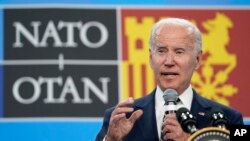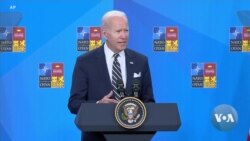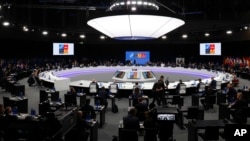NATO leaders concluded their three-day meeting in Madrid Thursday with the Western security alliance strengthening its defense against Russian aggression, warning of global challenges posed by China and inviting neutral countries Finland and Sweden into the group.
U.S. President Joe Biden described the summit as “historic.”
“The last time NATO drafted a new mission statement was 12 years ago,” Biden said, referring to a document also known as the alliance’s Strategic Concept.
“At that time, it characterized Russia as a partner, and it didn't mention China. The world has changed, changed a great deal since then, and NATO is changing as well. At this summit, we rallied our alliances to meet both the direct threats that Russia poses to Europe and the systemic challenges that China poses to a rules-based world order. And we've invited two new members to join NATO,” Biden said.
Biden reiterated that Russian President Vladimir Putin’s war on Ukraine has only strengthened NATO.
“He tried to weaken us, expected our resolve to fracture but he's getting exactly what he did not want,” Biden said. “He wanted the ‘Finland-ization’ of NATO. He got the ‘NATO-ization’ of Finland.”
On Wednesday Putin dismissed the imminent expansion of the Western alliance.
“With Sweden and Finland, we don't have the problems that we have with Ukraine. They want to join NATO, go ahead," Putin told Russian state television.
“But they must understand there was no threat before, while now, if military contingents and infrastructure are deployed there, we will have to respond in kind and create the same threats for the territories from which threats towards us are created,” he warned.
As it sets to expand, NATO leaders agreed on a massive increase in troop deployments across Europe. A total of 300,000 soldiers will be placed at high readiness across the continent starting next year to defend against potential military attacks by Moscow on any member of the alliance – what Secretary General Jens Stoltenberg characterized as “the most serious security crisis” since the Second World War.
To bolster NATO’s defense, the United States is also set to establish a permanent headquarters for the U.S. 5th Army Corps in Poland, add a rotational brigade of 3,000 troops and 2,000 other personnel to be headquartered in Romania, and send two additional squadrons of F-35 fighter jets to Britain.
Reaffirming commitments made by other Western leaders, Biden said the U.S. will stand firm against Russia’s aggression. He offered little indication the conflict would conclude anytime soon, suggesting that Americans would have to bear high gas prices longer.
“As long as it takes, so Russia cannot in fact defeat Ukraine and move beyond Ukraine," he said.
China challenge
Biden said the summit has brought together “democratic allies and partners from the Atlantic and the Pacific” to defend the rules-based global order against challenges from China, including its “abusive and coercive trade practices.”
NATO leaders have also called out the “deepening strategic partnership” between Beijing and Moscow as one of the alliance’s concerns.
Beijing is not providing military support for Russia’s war on Ukraine, but Chinese leader Xi Jinping has stated support for Moscow over “sovereignty and security” issues. The country continues to purchase massive amounts of Russian oil, gas and coal.
Biden noted that for the first time in the transatlantic alliance’s history, Asia Pacific leaders from Australia, Japan, New Zealand and South Korea participated at the summit.
With the reemergence of great power conflict, a strategic competitor sitting in each region, and an evolving Russia-China relationship, there are many common challenges that European and Asia-Pacific partners must discuss together, said Mirna Galic, senior policy analyst on China and East Asia at the United States Institute of Peace.
Galic told VOA these include issues already being worked on, such as cyber defense, maritime security and space, as well as those that will require some new thinking, such as intermediate-range nuclear forces, missile defense, inter-theater deterrence and defense, and how to push back on great power use of force in contravention of international norms.
“The last is certainly relevant to the Russian invasion of Ukraine but also has parallels with China and Taiwan, which is why Ukraine is seen as more than a European security issue,” Galic said.
In his remarks at the end of the NATO summit, Biden also touted the West’s latest counter to China’s multi-trillion-dollar Belt and Road Initiative (BRI).
“We also launched what started off to be the Build Back Better notion, but it's morphed into a Partnership for Global Infrastructure and Investment,” he said referring to the “Build Back Better World” initiative announced at the 2021 meeting of the Group of Seven leaders in Cornwall, UK and relaunched earlier this week as the PGII at the G-7 summit of leading industrialized nations in Krün, Germany.
Officials say PGII will offer developing nations $600 billion in infrastructure funding by 2027 and be a better alternative to China’s BRI that critics have characterized as “debt trap diplomacy.”








